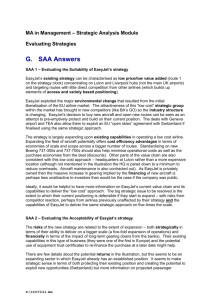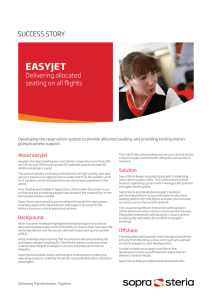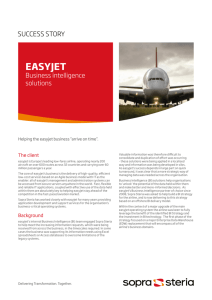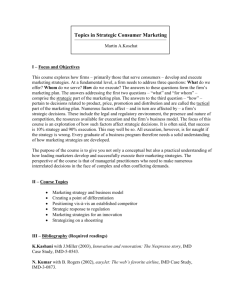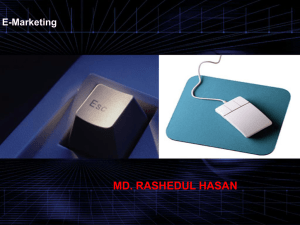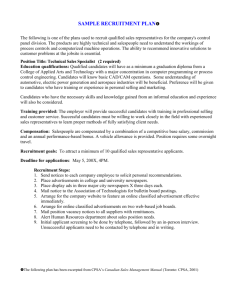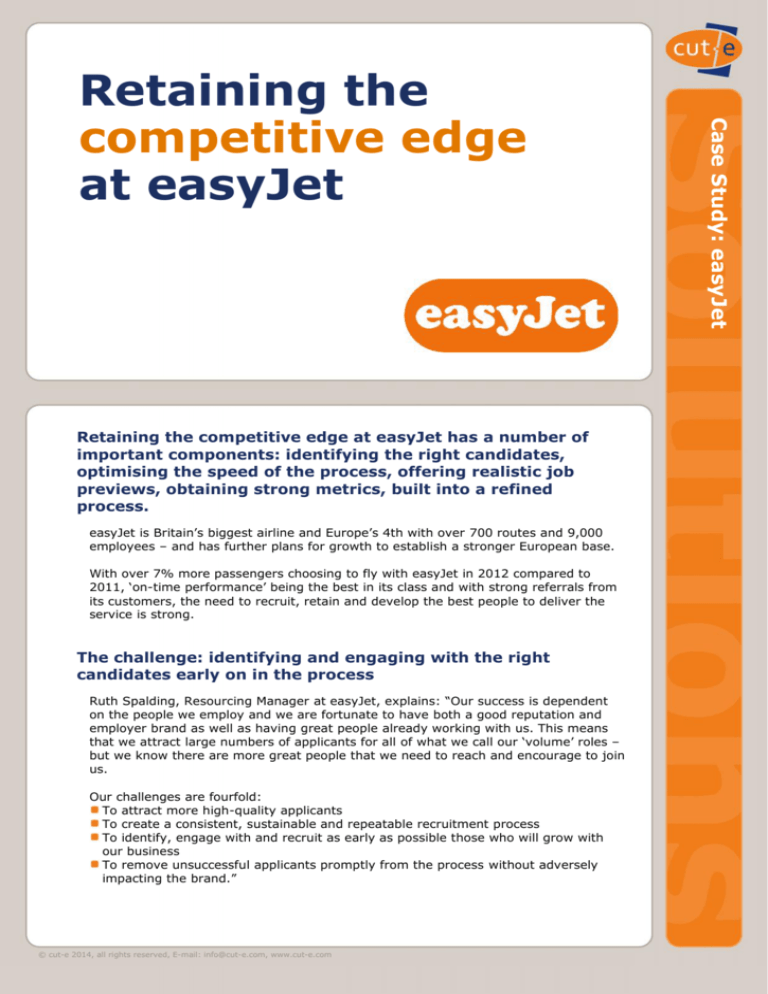
Retaining the competitive edge at easyJet has a number of
important components: identifying the right candidates,
optimising the speed of the process, offering realistic job
previews, obtaining strong metrics, built into a refined
process.
easyJet is Britain’s biggest airline and Europe’s 4th with over 700 routes and 9,000
employees – and has further plans for growth to establish a stronger European base.
With over 7% more passengers choosing to fly with easyJet in 2012 compared to
2011, ‘on-time performance’ being the best in its class and with strong referrals from
its customers, the need to recruit, retain and develop the best people to deliver the
service is strong.
The challenge: identifying and engaging with the right
candidates early on in the process
Ruth Spalding, Resourcing Manager at easyJet, explains: “Our success is dependent
on the people we employ and we are fortunate to have both a good reputation and
employer brand as well as having great people already working with us. This means
that we attract large numbers of applicants for all of what we call our ‘volume’ roles –
but we know there are more great people that we need to reach and encourage to join
us.
Our challenges are fourfold:
To attract more high-quality applicants
To create a consistent, sustainable and repeatable recruitment process
To identify, engage with and recruit as early as possible those who will grow with
our business
To remove unsuccessful applicants promptly from the process without adversely
impacting the brand.”
© cut-e 2014, all rights reserved, E-mail: info@cut-e.com, www.cut-e.com
Case Study: easyJet
Retaining the
competitive edge
at easyJet
The solution: screening online ensures that only the best applicants are
invited for face-to-face assessment
With a high volume of applications, understandably there is variation in the quality of these and the
challenge for easyJet is to screen efficiently so that time is spent only with those applicants most
likely to succeed – and that unsuccessful applicants still have a positive experience of the process.
With this in mind, easyJet introduced an online questionnaire, a realistic job profile for those who
have an interest in becoming cabin crew. Offering a realistic insight into the role of cabin crew within
easyJet, this helps prospective candidates to take themselves out of the process if they don’t feel the
role is right for them. It means that applications from those more suited and enthusiastic about the
role are received and progressed.
As part of the first stage of the application process all candidates are invited to complete an online
verbal ability test and a specifically designed and validated Situational Judgement Questionnaire,
delivered through easyJet’s ATS. At this early stage, easyJet is able to assess and remove those who
are unable to meet minimum standards from the process and move those more suited to the role
through to CV screen.
In order to identify the most suitable candidates, the easyJet team worked with cut-e to develop a
‘fit’ status, combining the scores from the ability test and the Situational Judgement Questionnaire;
those with a ‘low fit’ were not taken further, but those with ‘mid’ or ‘hit fit’ scores progressed to the
CV screening stage, and then onto an assessment centre. The benefit of this approach is its
consistency across all locations, the minimum input needed from the lean easyJet team and the
sustainability of the process.
Screenshots easyJet Situational Judgement Questionnaire by cut-e
The outcome: metrics highlight conversion rate improvement and
performance improvement – across a range of positions
The cut-e conference of 2013 highlighted the growth in use of HR analytics and metrics across
organisations and this is reflected at easyJet. Ms Spalding, who presented during the conference,
explains, “A key objective for us is to improve the quality and ‘fit’ of candidates who join us at
assessment centres. Bringing only the best people to these events means that we improve our speed
of hire as well as cost, spending valuable assessment centre time and resource with candidates likely
to succeed and accept an offer.”
As refinements to the online testing process have taken shape, easyJet has seen an uplift in the
conversion rates of those attending the face-to-face assessment centres. When candidates were
tested at the assessment centre itself with no prior online activity, the conversion rate of those
attending to successful hire was 41%. By moving assessment online and earlier in the process, this
conversion rose to 48% and by adding in the realistic job preview, the conversion is now 55%. This
means that there now need to be fewer costly assessment centres organised to meet the target
recruitment figures. In terms of cost savings this equates to over 100k GBP over 3 years.
But the impact of recruiting higher-quality candidates is seen also in the reduction of training course
failures, an increase in role performance and an improvement in base feedback.
Taking online assessment into other job positions to achieve more benefits
With the success of the cabin crew approach, easyJet introduced a refined process for the promotion
of crew to cabin manager. Its co-pilot recruitment process has also undergone revision, with online
testing benchmarked against peer group being used early in the process. With this introduction,
conversion rate at the assessment centre stage has increased to over 70% – saving over 10k GBP in
the year of the initial introduction.
In addition, easyJet has seen a growth of over 350% in applications to join its graduate programme
in the past two years. With a new process including online verbal, numerical and inductive capability
tests early in the application route, easyJet has been able to complete their graduate recruitment in
the fastest time for three years, run a fewer number of assessment centres than in previous years
and yet delivered the number of graduates the business requires.
“The Situational Judgement Questionnaire has been developed for us by cut-e and takes into
account how we at easyJet want our cabin crew to act – and react – in their role. It has been
designed in conjunction with our current high-performing cabin crew members and those who we
see as ‘experts’ within our business for this role. This means that it makes a great assessment of
success within our easyJet cabin crew culture.”
Ruth Spalding, Resourcing Manager at easyJet
Critical success factors for easyJet
It is clear that easyJet has been able to transform its application and selection process for some
of its key job roles, speeding up the time to hire, reducing costs and yet maintaining an
employer brand position.
This is due to its:
Understanding of what great performance looks like for their people
Commitment to validity in ensuring the tests and questionnaires used do predict success in the
role
Creation of seamless processes for the applicant ensuring that the ATS provider and cut-e
data are integrated into a single applicant record
Need for a repeatable, sustainable recruitment process model capable of use across Europe
Dedication to engaging with all applicants fairly, transparently and honestly
Access to, and measurement of, key success metrics: they know how they have improved and
the impact this has had on their recruitment
Continued process improvement always with a view to getting better applicants through the
pipeline and into the assessment centres.
For any further information, please don’t hesitate to contact us!
E-mail: info@cut-e.com
www.cut-e.com
E-mail: info@cut-e.com
www.cut-e.com

